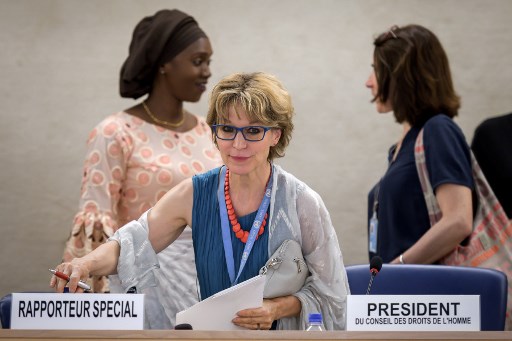
(Eagle News) – The United Nations Special Rapporteur for extrajudicial, summary or arbitrary executions thanked the United Nations Human Rights Council for adopting the resolution seeking a comprehensive written report into Philippone government’s drug war.
In her tweet, UN Special Rapporteur Agnes Callamard said that she was also thanking the UN human rights body “on behalf of the thousands of victims of a senseless war on drugs, the dozens of murdered defenders, lawyers, farmers and indigenous people.”
Callamard also warned the Philippine government not to reject the results of the review that will happen on the drug war.
In a separate interview with CNN Philippines, Callamard said that President Rodrigo Duterte’s administration could reject the
Iceland resolution, but there would be consequences if it would reject the results of the drug war review and report.
“Rejection of the resolution itself may not have a cost, what will have a cost is the rejection of the findings of the inquiry,” she said in the interview.
“The cost can take many shapes – it can be sanctions, it can be something related to the assistance, developmental assistance, it can be symbolic, it can be economic, it can be political,” she said.
Callamard also hoped that the resolution would prod the Philippine government “to do the right thing.”
“I’m hoping that the resolution is sending a signal to the government that they must proceed with the recommendations which are: investigate properly all the killings that have taken place at the hands of the police, put an end to the brutal war on drugs, adopt a human rights based approach to fighting crimes,” she said in the CNN Philippines interview.
“What we really, really want is for the government to do the right thing,” she added.
The text, proposed by Iceland, was backed by 18 states in the 47-member council, with 14 nations voting against and 15 abstentions.
The 18 countries which voted for the resolution were the following: Argentina, Australia, Austria, Bahamas, Bulgaria, Croatia, Czech Republic, Denmark, Fiji, Iceland, Italy, Mexico, Peru, Slovakia, Spain, Ukraine, United Kingdom of Great Britain and Northern Ireland, and Uruguay
It gives UN High Commissioner for Human Rights Michelle Bachelet a year to prepare a “comprehensive written report on the situation of human rights in the Philippines”.
Bachelet’s spokeswoman, Ravina Shamdasani, said the report would offer an opportunity to “get clarity around the contested facts, figures and circumstances” of the drug war.
The Philippine government, however, immediately rejected the resolution and questioned its validity as it did not get a majority vote.








